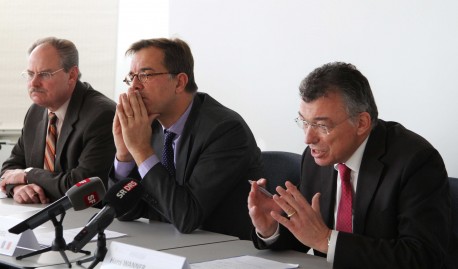Gute Noten für Schweizer Atomaufsicht
Das Eidgenössische Nuklearsicherheitsinspektorat (ENSI) handelt unabhängig, es hat die richtigen Schlüsse aus dem Unfall in Fukushima gezogen und es verpflichtet die Betreiber der Kernkraftwerke zu laufenden Nachrüstungen: Lob, aber auch konkrete Verbesserungsvorschläge von den Experten der Internationalen Atomenergie-Agentur IAEA für das ENSI.
Heute ging die zweiwöchige Überprüfung des ENSI durch eine internationale Expertengruppe der IAEA zu Ende. Zwischen dem 20. November und dem 2. Dezember 2011 haben mehr als zwei Dutzend Experten aus 14 Ländern das ENSI und seine Arbeit genau unter die Lupe genommen. Während der so genannten IRRS-Mission besuchten die Experten der IAEA viele Kernanlagen in der Schweiz, sie begleiteten die Inspektoren des ENSI auf Inspektionen, sie beobachteten eine Notfallübung und sie überprüften die gesetzlichen Grundlagen und das Regelwerk in der Schweiz.
Das Urteil der Experten fällt dabei mehrheitlich positiv aus. „Unser Team gewann einen guten Eindruck des ENSI als unabhängige Organisation“, sagte der Leader des Missionsteams, der Franzose Jean-Christophe Niel. Besonders beeindruckt hat die Expertengruppe, wie das ENSI auf den Unfall in Fukushima reagiert hat und schnell Massnahmen für die Kernkraftwerke in der Schweiz verfügt hat. Überhaupt lobten die Experten, dass die Anlagen in der Schweiz kontinuierlich nachgerüstet und dem Stand der Technik angepasst werden.
Als verbesserungswürdig erachteten die Experten vor allem die staatlichen Rahmenbedingungen, in denen das ENSI agiert. Auch sollte das schweizerische Regelwerk in den Bereichen radioaktive Abfälle, Stilllegung und Transport weiter entwickelt werden.
„Die Resultate der IRRS-Mission werden uns helfen, unsere Arbeit ständig zu verbessern. Das ist Teil unserer Sicherheitskultur“, sagte ENSI-Direktor Hans Wanner. Er versprach auch, dass die Schweiz Massnahmen ergreifen werde, um die Verbesserungsvorschläge der IAEA umzusetzen.
Der vollständige Bericht der IAEA zur IRRS-Mission in der Schweiz wird voraussichtlich in drei Monaten fertig gestellt sein.
Medienmitteilung der IAEA:
International Nuclear Safety Experts Conclude IAEA Peer Review of Swiss Regulatory Framework
2 December 2011 | Brugg, Switzerland – A team of international nuclear safety experts today completed a two-week International Atomic Energy Agency (IAEA) review of the regulatory framework for nuclear safety in Switzerland.
The Integrated Regulatory Review Service (IRRS) mission noted good practices in the Swiss system and also made recommendations for the nation’s nuclear regulatory authority, the Swiss Federal Nuclear Safety Inspectorate (ENSI).
“Our team developed a good impression of the independent Swiss regulator — ENSI — and the team considered that ENSI deserves particular credit for its actions to improve Swiss safety capability following this year’s nuclear accident in Japan,” said IRRS Team Leader Jean-Christophe Niel of France.
The mission´s scope covered the Swiss nuclear regulatory framework for all types of nuclear-related activities regulated by ENSI. The mission was conducted from 20 November to 2 December, mainly at ENSI headquarters in Brugg. The team held extensive discussions with ENSI staff and visited many Swiss nuclear facilities.
IRRS missions are peer reviews, not inspections or audits, and are conducted at the request of host nations. For the Swiss review, the IAEA assembled a team of 19 international experts from 14 countries. The experts came from Belgium, Brazil, the Czech Republic, Finland, France, Germany, Italy, the Republic of Korea, Norway, Russia, Slovakia, Slovenia, the United Kingdom, and the United States.
“The findings of the IRRS mission will help us to further improve our work. That is part of our safety culture,” said ENSI Director General Hans Wanner. “As Switzerland argued at international nuclear safety meetings this year for a strengthening of the international monitoring of nuclear power, we will take action to fulfil the recommendations.”
The IRRS team highlighted several good practices of the Swiss regulatory system, including the following:
- ENSI requires Swiss nuclear operators to back-fit their facilities by continuously upgrading equipment and safety procedures and adopting current technology to maximize nuclear safety;
- ENSI demonstrates openness and transparency by posting significant documents on its website, including reports on safety research, applicable lessons from foreign nuclear power plants, and safety assessments for all Swiss nuclear power plants; and
- ENSI’s comprehensive and user friendly management system enables the regulator to work effectively and efficiently to oversee Swiss nuclear safety.
The IRRS team also made recommendations to improve the Swiss regulatory system, including the following:
- As ENSI was established as an independent regulatory body in 2009 as part of a revised government framework, the Swiss government should actively monitor how this new framework is working and make improvements as needed;
- ENSI needs the authority to set conditions for licensing nuclear activities and to issue regulatory requirements; and
- The Swiss regulatory framework should continue evolving its graded approach to safety, and further develop its inspection efforts in all areas, especially in waste, decommissioning and transport.
In a preliminary report, the IAEA has conveyed the team´s main conclusions to ENSI, and a final report will be submitted to the authority in about three months. ENSI has told the team that it will make the report public. The IAEA encourages nations to invite a follow-up IRRS mission about two years after the full mission has been completed.
About IRRS Missions
IRRS missions are designed to strengthen and enhance the effectiveness of the national nuclear regulatory infrastructure of States, while recognizing the ultimate responsibility of each State to ensure safety in this area.
This is done through consideration of both regulatory, technical and policy issues, with comparisons against IAEA safety standards and, where appropriate, good practices elsewhere.
More information about IRRS missions is available on the IAEA Web site: http://www-ns.iaea.org/reviews/rs-reviews.asp


